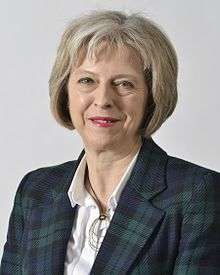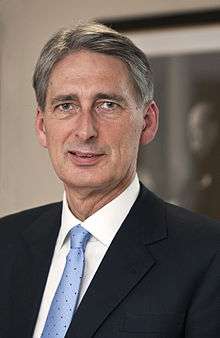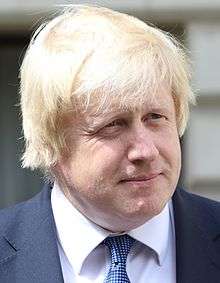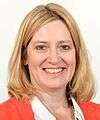Great Offices of State
.svg.png) |
| This article is part of a series on the politics and government of the United Kingdom |
|
|
|
|
The Great Offices of State in the United Kingdom are the four most senior and prestigious posts in the British government.[1][2] They are the Prime Minister, Chancellor of the Exchequer, Foreign Secretary and Home Secretary. According to convention, when the Prime Minister names his or her Cabinet, either after a general election or a mid-term reshuffle, the first Cabinet ministers to be announced are the Chancellor, the Foreign Secretary and the Home Secretary.[1][3][4]
Current
| Office | Incumbent | Term began | |
|---|---|---|---|
| Prime Minister |  |
Theresa May | 13 July 2016 |
| Chancellor of the Exchequer |  |
Philip Hammond | 13 July 2016 |
| Foreign Secretary |  |
Boris Johnson | 13 July 2016 |
| Home Secretary |  |
Amber Rudd | 13 July 2016 |
History
James Callaghan is the only person to date to have served in all four positions.[1][5] In the past hundred years, several other people have come close to achieving this distinction: Herbert Henry Asquith and Winston Churchill both served as Chancellor, Prime Minister and Home Secretary while Harold Macmillan and John Major served as Prime Minister, Chancellor and Foreign Secretary. Rab Butler and Sir John Simon served as Chancellor of the Exchequer, Foreign Secretary and Home Secretary. Two of the Great Offices of State have often been held simultaneously by one person, most recently by Ramsay MacDonald, Prime Minister and Foreign Secretary in 1924; Arthur Wellesley, the famous Duke of Wellington, is the only person to have held three of the Great Offices simultaneously, serving as Prime Minister, Home Secretary and Foreign Secretary in the Wellington caretaker ministry.
Commons-only nature in modern times
Owing to the political constitution of the United Kingdom, in which the House of Commons retains most of the power, it is accepted that it is no longer practical for holders of the Great Offices of State to be members of the House of Lords. The House of Lords has traditionally been restrained in the passage of financial bills, meaning that the office of Chancellor is effectively limited to the House of Commons. The last holders of the other positions to have been peers were:
- Prime Minister: Conservative The Earl of Home (20–23 October 1963): The Earl of Home renounced his peerage and was elected as an MP after his appointment as Prime Minister. The last holder to remain a peer throughout his term as Prime Minister was the Conservative Marquess of Salisbury (25 June 1895 – 11 July 1902).
- Chancellor of the Exchequer: Whig Lord Denman (14 November–15 December 1834): Denman only held the post on an acting basis as an ex officio duty of his role as Lord Chief Justice, as did the peer before him, Conservative Lord Tenterden (8 August–3 September 1827); the last member of the House of Lords to hold the office substantively was Whig Viscount Stanhope (15 April 1717 – 20 March 1718).
- Foreign Secretary: Conservative Lord Carrington (5 May 1979 – 5 April 1982): The Lord Carrington is the most recent peer to hold one of the Great Offices of State.
- Home Secretary: Conservative Viscount Cave (14 November 1918 – 14 January 1919): Sir George Cave was ennobled as The Viscount Cave while serving as Home Secretary in 1918.
It is most exceptional that a holder of a Great Office of State should not hold a seat in Parliament at all, neither in the Commons nor in the Lords. It occurred briefly in 1963, when Alec Douglas-Home was appointed Prime Minister: he disclaimed his peerage on 23 October, and was not returned to the Commons until a by-election on 7 November. More substantially, Patrick Gordon Walker was appointed Foreign Secretary in 1964 despite not holding a Parliamentary seat, having been defeated in his Smethwick constituency seat in the 1964 general election; he held the post for three months until his resignation in January 1965.
Women
Only five women have held any of the Great Offices of State. Out of the four Offices, three have been held by women; Chancellor of the Exchequer is the only position that has not. Due to her ascension to the office of Prime Minister in July 2016, Theresa May became the first woman to hold two different Great Offices of State, with the appointment of Amber Rudd as Home Secretary resulting in the first period in which more than one of the Offices were held by women simultaneously.
- Prime Minister: Margaret Thatcher (1979–1990), Theresa May (2016–present)
- Foreign Secretary: Margaret Beckett (2006–2007)
- Home Secretary: Jacqui Smith (2007–2009), Theresa May (2010–2016), Amber Rudd (2016–present)
See also
- Cabinet of the United Kingdom
- List of shadow holders of the Great Offices of State
- Secretary of State (United Kingdom)
- HM Treasury
- Great Officer of State
References
- 1 2 3 McKie, David (28 March 2005). "Lord Callaghan". politics.guardian.co.uk. London: Guardian Unlimited. Retrieved 10 June 2008.
He had held all four of the great offices of state
- ↑ Eason, Gary (27 March 2005). "Callaghan's great education debate". BBC News.
- ↑ "Open Politics". news.bbc.co.uk. BBC News. Retrieved 26 July 2007.
- ↑ "Article by John Rentoul". comment.independent.co.uk. London: The Independent. 5 December 2004. Retrieved 26 July 2007.
- ↑ "Lady Callaghan of Cardiff". The Independent. London. 30 March 2005.